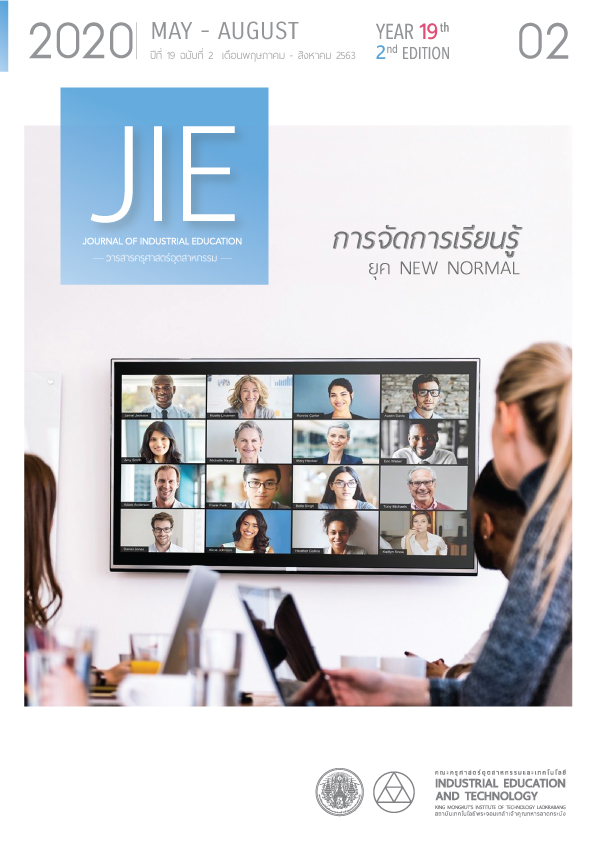ผลการใช้แชทบอทช่วยในการจัดการเรียนรู้แบบผสมผสาน สำหรับผู้เรียนระดับประกาศนียบัตรวิชาชีพ ในสถานศึกษาสังกัดสถาบันการอาชีวศึกษาภาคตะวันออกเฉียงเหนือ 1
Main Article Content
บทคัดย่อ
การวิจัยนี้เป็นการวิจัยเชิงทดลองมีวัตถุประสงค์เพื่อศึกษาผลการนำแชทบอทมาช่วยในการจัดการเรียนรู้แบบผสมผสาน โดยใช้เป็นตัวช่วยในการนำเสนอเนื้อหาทบทวนความรู้ ผู้เรียนสามารถทำแบบฝึกหัดเพื่อเพิ่มความจำในการเรียนซึ่งเป็นปัจจัยหนึ่งที่ช่วยให้ผลสัมฤทธิ์ทางการเรียนดีขึ้น แชทบอทที่พัฒนาขึ้นเป็นแบบสนทนาโต้ตอบผ่านข้อความ (Text-based Conversational Chatbot) ถูกออกแบบให้สามารถเข้าถึงได้ง่ายผ่านแอปพลิเคชัน Facebook Messenger มีบุคลิกลักษณะและการใช้ภาษาคล้ายกับวัยของผู้เรียน ใช้วิธีการประมวลผลภาษาธรรมชาติ (Natural Language Processing: NLP) เพื่อแปลข้อความสนทนาเป็นเจตจำนง (Intent) ตามเรื่องราวการสนทนาที่ได้ออกแบบไว้ ทำการทดลองโดยใช้แบบแผนการทดลองแบบ Pretest Posttest Control Group Design เพื่อเปรียบเทียบผลสัมฤทธิ์ทางการเรียนของผู้เรียน และแบบแผนการทดลองแบบ Static Group Comparison Design เพื่อเปรียบเทียบความจำขณะทำงานของผู้เรียน ประชากรในการศึกษาเป็นนักศึกษาระดับประกาศนียบัตรวิชาชีพในสถานศึกษาขนาดใหญ่ในสังกัดสถาบันการอาชีวศึกษาภาคตะวันออกเฉียงเหนือ 1 จากนั้นทำการสุ่มกลุ่มตัวอย่างโดยการเลือกชั้นเรียนด้วยวิธีการสุ่มแบบกลุ่มแล้วแบ่งออกเป็น 2 กลุ่มได้แก่ กลุ่มทดลองจำนวน 30 คนที่ได้รับการจัดการเรียนแบบผสมผสานการใช้แชทบอทช่วยจัดการเรียนรู้ และกลุ่มควบคุม 30 คนที่ได้รับการจัดการเรียนรู้แบบปกติ ในเนื้อหาเรื่องพื้นฐานสารประกอบไฮโดรคาร์บอน รายวิชาวิทยาศาสตร์เพื่อพัฒนาทักษะชีวิต เครื่องมือที่ใช้ในการวิจัยประกอบด้วยแชทบอทสำหรับช่วยในการจัดการเรียนรู้ แบบทดสอบวัดผลสัมฤทธิ์ทางการเรียน และแบบทดสอบวัดความจำขณะปฏิบัติงานของผู้เรียน วิเคราะห์ข้อมูลด้วยค่าเฉลี่ยและส่วนเบี่ยงเบนมาตรฐาน เปรียบเทียบความแตกต่างของผลสัมฤทธิ์ทางการเรียนและความจำของผู้เรียนทั้งสองกลุ่มด้วยสถิติทดสอบทีแบบกลุ่มตัวอย่างเป็นอิสระต่อกัน (Independent Sample t-test) ผลการวิจัยพบว่าผลสัมฤทธิ์ทางการเรียนและความจำขณะปฏิบัติงานของผู้เรียนกลุ่มทดลองสูงกว่าผู้เรียนกลุ่มควบคุมอย่างมีนัยสำคัญทางสถิติที่ระดับ .01
Article Details
"ข้อคิดเห็น เนื้อหา รวมทั้งการใช้ภาษาในบทความถือเป็นความรับผิดชอบของผู้เขียน"
References
Office of the Vocational Education Commission. 2019. The 2019 Curriculum for Certificate of Vocational Education. Retrieved May 5, 2020, from https://bsq.vec.go.th/
Peera Wongupparaj and RangsiratWongupparaj. 2016. 39 Years of Working Memory Model: Research and Its Application. Research Methodology and Cognitive Science, 10(2), p. 1–16.
Buranee Rabiab and Suchada Kornpetpanee. 2016. The Development of an Arithmetic Training Program Based on The Triple Code Model for Improving Working Memory among Grade One Students. Research Methodology and Cognitive Science, 14(2), p. 102–113.
Sanit Srikoon and Ketsaraphan Punsrigate Khonjaroen . 2020. The Investigation of Working Memory Influencing on Mathematics Achievement. Journal of Arts Management, 4(1), p. 139-150.
BRAIN [BRN.AI] CODE FOR EQUITY. 2019. Chatbot Report 2019: Global Trends and Analysis. Retrieved April 22, 2020, from https://chatbotsmagazine.com/chatbot-report-2019-global-trends-and-analysis-a487afec05b
Shawar, B. A. and Atwell E. 2007. Chatbots: Are They Really Useful?. LDV Forum, 22(1), p. 29–49.
Sunisa Sornkaew. 2018. Chatbot Technology Adoption in Banking Business. Master of Business Administration, Faculty of Commerce and Accountancy, Thammasat University.
Molnár, G. and Szuts, Z. 2018. The Role of Chatbots in Formal Education. In Proceedings of IEEE 16th International Symposium on Intelligent Systems and Informatics (p. 197-201). Subotica, Serbia: (n.p.).
Hien, H. T. et al. 2018. Intelligent Assistants in Higher-Education Environments: The FIT-EBot,
a Chatbot for Administrative and Learning Support. In Proceedings of the Ninth International Symposium on Information and Communication Technology (p. 69–76). Da Nang, Vietnam: (n.p.).
Clarizia, F. et al. 2018. Chatbot: An Education Support System for Student. In Cyberspace Safety and Security. In Proceedings of 10th International Symposium on Cyberspace Safety and Security (p.291-302). Cham: Springer International Publishing.
Holotescu, C. 2016. MOOCBuddy: A Chatbot for Personalized Learning with MOOCs. In Proceedings of RoCHI 2016 (p. 91-94). (n.p.).
Colace, F. et al. 2018. Chatbot for E-Learning: A Case of Study. International Journal of Mechanical Engineering and Robotics Research, 7(5), p. 528–533.
Engati. 2019. Chatbot Applications in Education. Retrieved March 11, 2020, from https://medium .com/@getengati /chatbot-applications-in-education-bb836c09c6d3
Gill, M. 2019. 5 Ways Artificial Intelligence and Chatbots Are Changing Education. Retrieved April 2, 2020, from https://towardsdatascience.com/5-ways-artificial-intelligence-and-chatbots-are-changing-education-9e7d9425421d
Heller, B. et al. 2005. Freudbot: An Investigation of Chatbot Technology in Distance Education. In Proceedings of EdMedia + Innovate Learning 2005 (p. 3913-3918), Canada: Association for the Advancement of Computing in Education (AACE).
Jia, J. and Ruanm, M. 2008. Use Chatbot Csiec to Facilitate the Individual Learning in English Instruction: A Case Study. In International Conference on Intelligent Tutoring Systems (p.706-708). (N.P.): Springer.
Pham, X. L. et al. 2018. Chatbot as an Intelligent Personal Assistant for Mobile Language Learning. In Proceedings of the 2018 2nd International Conference on Education and E-Learning, ICEEL 2018 (p.16-21). New York, USA: Association for Computing Machinery.
Benotti, L. et al. 2014. Engaging High School Students Using Chatbots. ITICSE 2014 - Proceedings of the 2014 Innovation and Technology in Computer Science Education Conference, p. 63-68.
Fryer, L. K. et al. 2017. Stimulating and Sustaining Interest in a Language Course: An Experimental Comparison of Chatbot and Human Task Partners. Computers in Human Behavior, 75, p. 461–468.
Song, D. et al. 2019. Participation in Online Courses and Interaction With a Virtual Agent. International Review of Research in Open and Distributed Learning, 20(1), p. 43-62.
Abbasi, S. and Hameedullah K. 2014. Measuring Effectiveness of Learning Chatbot Systems on Student’s Learning Outcome and Memory Retention. Asian Journal of Applied Science and Engineering, 3(2), p. 251–260.
Fryer, L. K. et al. 2019. Chatbot Learning Partners: Connecting Learning Experiences, Interest and Competence. Computers in Human Behavior, 93, p. 279–289.
Ruan, S. et al. 2019. QuizBot: A Dialogue-Based Adaptive Learning System for Factual Knowledge. In Proceedings of the 2019 CHI Conference on Human Factors in Computing Systems (p. 1–13). Scotland, UK: (n.p.).
Monchai Tiantong. 2012. Research Methodology in Computer Education. Bangkok: King Mongkut’s University of Technology North Bangkok.

